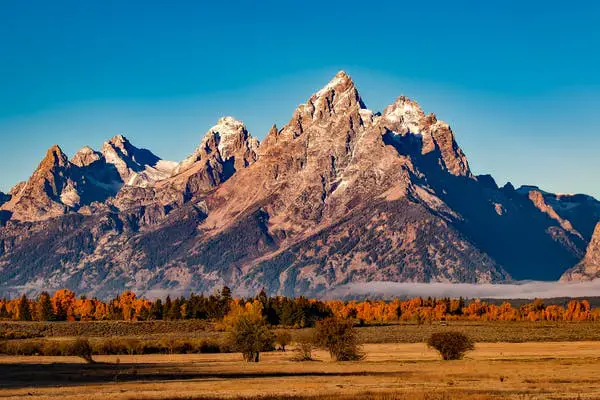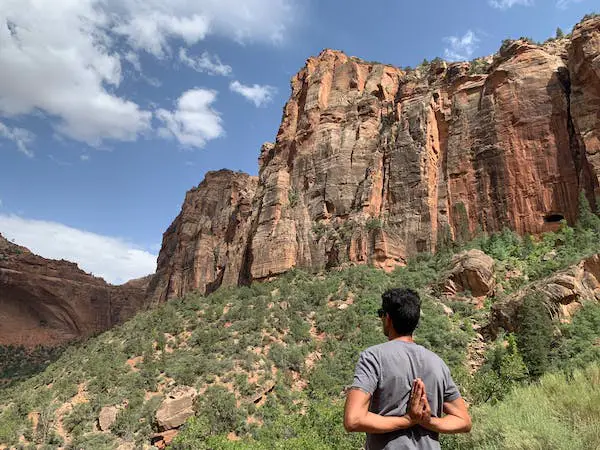Why Traveling in The Off-Season Can Be a Game-changer

Traveling is one of the most enriching experiences one can have, but it can be expensive, time-consuming, and, in some cases, overwhelming.
Many travelers tend to plan their trips during the high season, when the weather is pleasant, and the crowds flock to popular destinations.
However, there is another way to travel that can offer unique benefits and experiences - off-season travel.
Off-season travel is all about exploring destinations during their low season. This could mean traveling during the winter months, the rainy season, or during the shoulder season when the weather is not at its best.
While this might sound unappealing to some, there are plenty of reasons why off-season travel is a game-changer.
Cost-effectiveness

Off-season travel is an excellent way to experience destinations without breaking the bank. One of the most significant advantages of traveling during the low season is the cost-effectiveness.
It's an excellent opportunity to take advantage of discounted rates on airfare, accommodation, and activities.
During the high season, airlines and hotels increase their prices due to high demand. However, during the low season, there is less demand, which means that prices are often significantly cheaper.
This can mean saving hundreds of dollars on your trip, making it more affordable for travelers on a budget.
In addition, off-season travel can also provide better value for your money. Since prices are lower, you can use the money you save to upgrade your accommodations, dine at higher-end restaurants, or book more expensive activities.

For example, if you're traveling to a beach destination during the low season, you may be able to afford a beachfront room with a private balcony that would have been out of your budget during the high season.
Another advantage of off-season travel is that you can often find better deals on tours and activities. Tour operators and attractions are often less busy, so they may offer special deals and discounts to attract travelers.
This means you can take advantage of unique experiences that may be too expensive during the high season.
Overall, off-season travel is an excellent way to travel more cost-effectively. It's an opportunity to experience destinations without the crowds and enjoy better value for your money.
By traveling during the low season, you can save money and have a more enjoyable and relaxed travel experience.
Less crowded destinations

Off-season travel provides a unique opportunity to explore destinations without dealing with the crowds that typically flock to popular destinations during the high season.
One of the most significant advantages of traveling during the low season is that destinations are less crowded. This can make for a much more enjoyable and relaxed travel experience.
When traveling during the low season, you can explore attractions and landmarks without dealing with long lines and large crowds.
This means you can spend more time enjoying the destination and less time waiting in line or jostling for space. It's an excellent opportunity to take in the sights and sounds of a destination at your own pace without feeling rushed or overwhelmed.

In addition, fewer crowds also mean that you can enjoy more personalized service from hotels, restaurants, and tour operators.
Staff can take more time to attend to your needs and provide more personalized recommendations, making your trip more enjoyable and memorable.
Furthermore, off-season travel allows you to experience destinations in a more authentic way. Without the influx of tourists that often lead to commercialization and crowds, you can interact more with locals, visit local markets, and experience local customs and traditions in a more genuine way. This can give you a better sense of the local culture and way of life.
For example, if you travel to a popular beach destination during the low season, you may be able to enjoy the beach without dealing with large crowds.

You can take long walks along the shoreline, relax in a beachfront cabana, or try water sports without feeling crowded.
Additionally, you may be able to get a table at a popular beachfront restaurant without making a reservation weeks in advance.
In conclusion, traveling during the low season offers a unique opportunity to experience destinations without the crowds and enjoy a more personalized and authentic travel experience.
It's an excellent way to take in the sights and sounds of a destination at your own pace and make unforgettable memories.
Authentic experiences

Off-season travel can provide an authentic travel experience that you may not be able to get during the high season.
By avoiding the crowds and commercialization that often come with high-season tourism, travelers can get a deeper sense of the local culture, traditions, and way of life. This can make for a more meaningful and memorable travel experience.
During the low season, many destinations are less crowded, which means you can interact more with locals and participate in local events and activities.
For example, you may be able to attend a local festival, visit a small family-owned restaurant, or explore a hidden gem that only locals know about. These experiences can provide a more authentic glimpse into the local culture and way of life.

Furthermore, off-season travel can also provide a unique opportunity to engage in outdoor activities and explore nature. With fewer tourists, you may be able to take a hiking trail or go kayaking in a nature reserve without worrying about crowded conditions.
You may also be able to explore nature at your own pace, taking in the natural beauty without feeling rushed or distracted by crowds.
Another way to experience authenticity is to choose accommodation that reflects the local culture and traditions.
For example, staying in a locally-owned bed and breakfast or a traditional ryokan in Japan can provide an immersive experience that allows you to fully embrace the local culture and customs.

In conclusion, off-season travel can provide an authentic travel experience that allows travelers to connect more deeply with the local culture, traditions, and way of life.
By avoiding the crowds and commercialization that often accompany high-season tourism, travelers can enjoy a more meaningful and memorable travel experience.
So, if you want to experience a destination in a more genuine and immersive way, consider traveling during the low season.
Flexibility

Off-season travel offers a unique advantage of flexibility, allowing travelers to have more control over their travel plans. With fewer tourists, destinations are often more flexible and accommodating to travelers, which means you can have a more relaxed and enjoyable travel experience.
One of the most significant advantages of off-season travel is the flexibility to change your plans. During the high season, changing your plans can be challenging and expensive due to high demand and limited availability.
However, during the low season, you can often make changes to your travel plans with ease. This means you can adjust your itinerary if the weather changes, or if you find a new attraction or activity you want to explore.
In addition, traveling during the low season can also mean more flexible and accommodating accommodation options.
Hotels and vacation rentals are often more flexible with their check-in and check-out times, and you may be able to secure more favorable rates if you're flexible with your travel dates.

This can give you more freedom to plan your trip according to your own schedule, rather than being tied to the high-season constraints.
Furthermore, traveling during the low season can also mean more flexibility with activities and attractions. Tour operators and activity providers are often more accommodating and flexible with their schedules, allowing you to book tours and activities with shorter notice or even on the day of your visit.
Overall, off-season travel provides travelers with a level of flexibility and freedom that is not available during the high season.
With fewer tourists, destinations are often more accommodating, and travelers can enjoy a more relaxed and enjoyable travel experience. So, if you're looking for more flexibility and control over your travel plans, consider traveling during the low season.
Better weather

Off-season travel can be a great option for those seeking better weather in their travel destination. Depending on the location, traveling during the low season can provide travelers with more favorable weather conditions than during the high season.
One of the most significant advantages of off-season travel is the opportunity to enjoy better weather. In many popular destinations, the high season can be characterized by extreme weather conditions such as high heat, humidity, or heavy rainfall.
By traveling during the low season, travelers can avoid these extreme conditions and enjoy more moderate and pleasant weather.
For example, if you're planning a trip to the Caribbean, traveling during the low season can provide you with more favorable weather conditions.

During the high season, the Caribbean can be hot and humid, with frequent rain showers and the possibility of hurricanes.
However, during the low season, the weather is often cooler and drier, making it an ideal time for outdoor activities such as hiking, swimming, and snorkeling.
Similarly, if you're planning a trip to Europe, traveling during the low season can provide you with milder temperatures and fewer crowds.
Many European destinations can be extremely crowded and hot during the high season, making it difficult to enjoy outdoor activities or explore the city's historic landmarks.

However, during the low season, the weather is cooler, and the crowds are thinner, providing travelers with a more comfortable and enjoyable experience.
In conclusion, off-season travel can be an excellent option for travelers seeking better weather conditions. By avoiding extreme weather conditions and traveling during the low season, travelers can enjoy more moderate and pleasant weather, making it easier to explore and enjoy their destination.
So, if you're planning a trip, consider traveling during the low season to take advantage of the better weather conditions.
Wildlife sightings

Off-season travel can offer unique opportunities for wildlife sightings, making it an excellent option for nature and wildlife enthusiasts.
During the low season, wildlife may be more active, and visitors can often experience less crowded and more intimate encounters with animals in their natural habitats.
One of the most significant advantages of off-season travel is the opportunity to witness wildlife in their natural habitats. During the high season, many popular wildlife destinations can be overcrowded, making it difficult to spot animals or enjoy quiet moments in nature.
However, during the low season, visitors can enjoy more intimate and personal experiences with wildlife, as there are fewer tourists and less noise to scare the animals away.

For example, if you're planning a trip to Yellowstone National Park, traveling during the low season can provide you with unique opportunities to witness wildlife such as bison, elk, wolves, and bears in their natural habitats.
During the high season, many of these animals can be difficult to spot due to the crowds of tourists. However, during the low season, visitors can enjoy more frequent sightings and even the possibility of spotting animals that are usually elusive, such as lynx or mountain lions.
Similarly, if you're planning a trip to Africa, traveling during the low season can provide you with more opportunities to witness the famous Great Migration.
During the low season, the savannah is less crowded, and visitors can witness millions of wildebeest and other grazing animals as they move across the plains in search of fresh grass and water.

This can be an unforgettable experience for travelers who want to witness one of the most incredible wildlife spectacles on the planet.
In conclusion, off-season travel can be an excellent option for wildlife enthusiasts seeking unique opportunities to witness animals in their natural habitats.
By avoiding the crowds of the high season and traveling during the low season, visitors can enjoy more intimate and personal experiences with wildlife, making it easier to spot animals and enjoy quiet moments in nature.
So, if you're planning a trip, consider traveling during the low season to take advantage of the unique opportunities for wildlife sightings.
More personalized service

Off-season travel can provide visitors with a more personalized and tailored service, making it an excellent option for those who seek a more customized and unique travel experience.
During the low season, hotels, restaurants, and tourist attractions often have fewer visitors, allowing them to focus more on providing individualized and exceptional service to each guest.
One of the most significant advantages of off-season travel is the opportunity to receive more personalized service. During the high season, many popular tourist destinations can be overcrowded, leading to longer lines, crowded attractions, and less time for personalized attention from staff.
However, during the low season, visitors can enjoy a more relaxed and personalized experience, with more time and attention devoted to each guest.

For example, if you're planning a trip to a luxury resort, traveling during the low season can provide you with a more personalized and tailored experience.
During the high season, the resort may be packed with visitors, and the staff may be stretched thin, resulting in a less attentive and personalized experience.
However, during the low season, the staff can focus more on each guest, providing personalized attention and unique experiences that cater to each guest's individual interests and preferences.
Similarly, if you're planning a trip to a popular tourist attraction, traveling during the low season can provide you with a more customized and unique experience.

During the high season, the attraction can be overcrowded, making it challenging to enjoy the experience fully. However, during the low season, visitors can enjoy a more personalized and unique experience, with more time to explore and interact with staff, resulting in a more customized and tailored experience.
In conclusion, off-season travel can be an excellent option for visitors seeking a more personalized and tailored travel experience.
By avoiding the crowds of the high season and traveling during the low season, visitors can enjoy more time and attention from staff, resulting in a more relaxed, unique, and customized experience.
So, if you're planning a trip, consider traveling during the low season to take advantage of the more personalized service and tailored experiences available.
Cultural events

Off-season travel can provide unique opportunities to experience cultural events and festivals that are not available during the high season.
By traveling during the low season, visitors can enjoy more authentic and intimate experiences with local culture and traditions, providing a more immersive and unique travel experience.
One of the most significant advantages of off-season travel is the opportunity to experience cultural events and festivals that are not available during the high season.
During the low season, many destinations hold cultural events and festivals that are less crowded and more authentic, providing visitors with a unique and memorable experience.

For example, if you're planning a trip to Japan, traveling during the low season can provide you with the opportunity to witness unique cultural events such as the Sapporo Snow Festival or the cherry blossom festivals.
These festivals are held during the low season when the weather is colder, and there are fewer tourists, making them a more intimate and authentic experience.
Similarly, if you're planning a trip to Europe, traveling during the low season can provide you with the opportunity to witness unique cultural events such as the Carnival of Venice or Oktoberfest in Munich.
These events are held during the low season when there are fewer tourists, making them a more intimate and authentic experience.

In addition to festivals and cultural events, traveling during the low season can also provide visitors with more opportunities to explore local culture and traditions.
With fewer tourists, visitors can enjoy a more authentic and immersive experience, such as dining at local restaurants, shopping at local markets, or participating in local activities.
In conclusion, off-season travel can be an excellent option for visitors seeking unique opportunities to experience cultural events and traditions.
By avoiding the crowds of the high season and traveling during the low season, visitors can enjoy a more authentic and intimate experience, providing a more immersive and unique travel experience.
So, if you're planning a trip, consider traveling during the low season to take advantage of the unique cultural events and experiences available.
Summary
Off-season travel refers to traveling during the low season or less popular time of the year to avoid crowds and enjoy various benefits such as cost-effectiveness, less crowded destinations, authentic experiences, flexibility, better weather, wildlife sightings, more personalized service, and unique opportunities for cultural events.
By traveling during the low season, visitors can save money on flights, accommodations, and attractions while enjoying more authentic and intimate experiences.
They can also enjoy more flexibility, personalized attention, and tailored experiences, such as wildlife sightings, cultural events, and unique local experiences.
In conclusion, off-season travel provides a more unique, affordable, and personalized way to explore destinations while avoiding the crowds of the high season.
